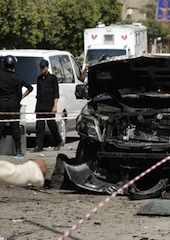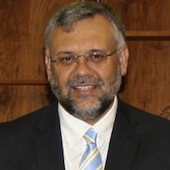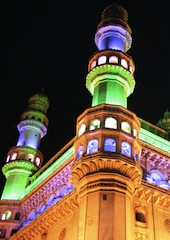Living Where You Don’t Make the Rules (Part II)
Openness versus Retreat: Strategies for Coping with the Modern World.
November 28, 2013

This is part two of a three-part series on Muslims, faith and cultural change in the age of globalization.
When I engage with a group of Muslim leaders from a country where they live in the minority, I don’t start out with an assumption that they are fundamentally different from a group of Christians in the charismatic tradition. Nor are they different from a group of ultra-orthodox Jews or a group of business people who don’t understand the world as we understand it.
Paradoxically, I think that the world today is actually less divided by the formal categories of Muslim, Christian, Hindu or Jew. It’s less divided by ideology. But it is very much divided by mindsets.
The response to the uncertainty in the world is threefold: orthodoxy, fundamentalism and a third way of embracing complementary identities, multiculturalism.
Response 1: Orthodoxy
First, there are those who retreat into orthodoxy. They rely solely on what they know, what has been given to them by tradition, what they have inherited from their forbearers and the thoughts that were packaged in books.
Those are the people who retreat into the mosques and who want women to be what they have always been. Those are the people who want to bring up their children as they were brought up, despite the fact that their children have more information at the age of 10 than they themselves have had at the age of 50.
The siren song of orthodoxy is very tempting. But our priests, imams and rabbis also know when they sit in the church, the mosque or the synagogue that the congregation is getting older.
The youth presence is shrinking and the preachers realize that they are speaking to the last generations of people who will hold onto orthodoxy, who will find credibility in it.
The inability of orthodoxy to give answers to the world today in any discipline, any religion or any ideology has created great impatience.
Response 2: Fundamentalism
Second, there are those who have become fundamentalists. They chose fundamentalism because they have grown impatient with orthodoxy, because it is unable to give answers to the world today – in any discipline, any religion or any ideology.
Fundamentalists have decided that they will not live where they don’t make the rules – they will fight to make their rules universal. They want to destroy the status quo because they can’t live where they don’t make the rules.
Their stance doesn’t allow for tolerating difference. They must destroy difference. It doesn’t allow for tolerance of the other, so the other must go. The other must either be like them – or go.
This attitude comes up crudely in places, for example, where and when extremists place car bombs, whether destined for Sufis or for Shias. It comes up in sophisticated debates on television screens about immigration. Whether it’s sophisticated or crude, it’s the same thing.
The crux is the extreme character of the fundamentalists’ response. It also won’t astound anyone that fundamentalists actually have certain things in common among themselves. What is, in fact, the difference between a Muslim fundamentalist, a Christian fundamentalist, a Jewish fundamentalist, an economic fundamentalist or an environmental fundamentalist?
They prefer to use labels because they are not able to debate beyond their own blinders. Some of them kill because they can’t embrace. They die for the cause because they don’t know how to live amid the changed conditions.
In a very real way, we have two extremes: orthodoxy in a state of inertia, not moving forward and not moving back, and fundamentalism that is nihilistic and destructive.
How do we live where we don’t make the rules?
The third response is up to those of us who find ourselves in the middle – in living where we don’t make the rules. How do we embrace the unknown? How do we live where we don’t make the rules?
How do we every day go about being “bewildered” by unfolding that path that Rumi speaks about? How do we help by walking the path to show the way, not knowing the way, but discovering it and telling people, “It’s safe here,” “it’s okay here,” and “it may even be very nice here”?
It is okay because we are discovering different people. We are eating different foods. We are seeing (as Rumi also says) the same sun. It may be lighting up different worlds in different ways, but it is the same sun.
Christians may not prostrate as Muslims do. But whatever they do they do to the same God.
Takeaways
The world is less divided by the categories of Muslim, Christian, Hindu or Jew. It’s divided by mindset.
The response to the uncertainty in the world is threefold: orthodoxy, fundamentalism or multiculturalism.
We have two extremes: orthodoxy in a state of inertia – and fundamentalism that is nihilistic and destructive.
The inability of orthodoxy to give answers in any discipline, religion or ideology has created great impatience.
What is the difference between a Muslim fundamentalist, a Christian, a Jewish, an economic or an environmental one?
Fundamentalists prefer to use labels because they are not able to debate beyond their own blinders.
Fundamentalists die for the cause because they don’t know how to live amid changed conditions.
Fundamentalists don’t want to live where they don’t make the rules. They fight to make their rules universal.
How do we sense, “It’s safe here,” “it’s okay here,” and “it may even be very nice here”?
Today, children have more information at the age of 10 than the orthodox have had at the age of 50.
Although it may be lighting up different worlds in different ways, we are seeing the same sun.
Christians may not prostrate as Muslims do. But whatever they do they do to the same God.

